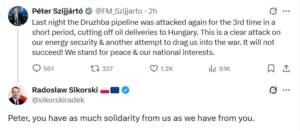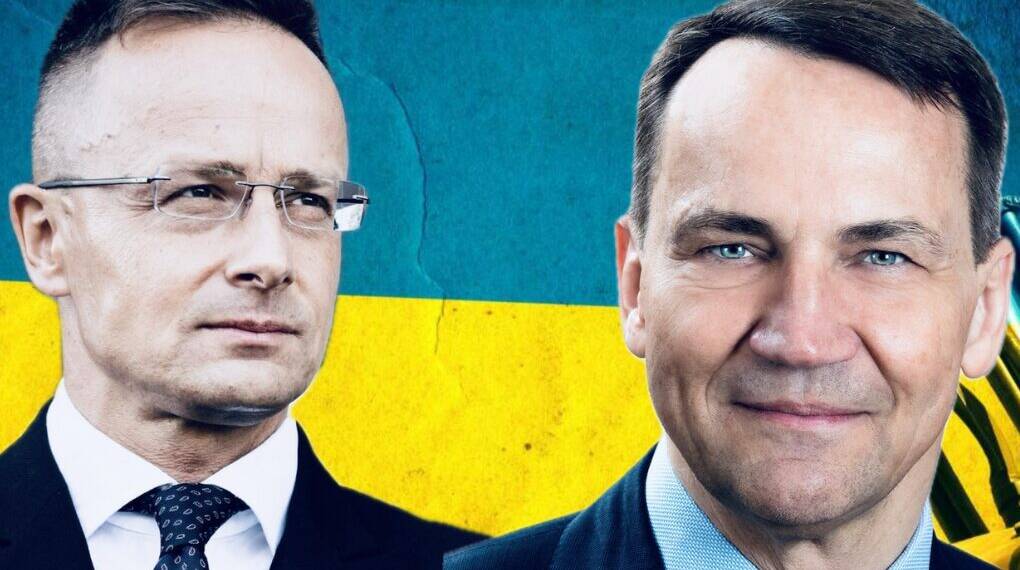The ongoing conflict in Ukraine is having increasing repercussions on Europe’s energy landscape, particularly in Central and Eastern Europe. A recent diplomatic spat has erupted between Poland and Hungary, two key EU players, over Ukrainian attacks targeting the Russian-operated Druzhba oil pipeline, which supplies crude oil to both countries.

Polish Deputy Prime Minister Radosław Sikorski responded with a tone of sarcasm to complaints from Hungarian Foreign Minister Péter Szijjártó, who accused Ukraine of repeatedly attacking the Druzhba pipeline and warned that these actions threaten Hungary’s energy security and risk dragging the country into the wider conflict.
Polish Deputy PM’s Sharp Reply to Hungarian Concerns
Szijjártó’s complaints, shared widely on social media, described the latest attack on the Druzhba pipeline as the third within a short period, underscoring a growing pattern. In retaliation, Sikorski wrote in a sarcastic comment, “Peter, you have as much solidarity from us as we have from you.”
This statement reflects broader frustrations amid a complicated geopolitical environment — Poland has voiced continued, strong support for Ukraine, whereas Hungary has taken a more cautious stance, resisting some EU sanctions on Russian energy imports.
Background: The Druzhba Pipeline Attacks
The Druzhba pipeline, a legacy of Soviet infrastructure, transports Russian crude oil to Central European countries, including Hungary and Slovakia. It has become a focal point of the conflict’s energy dimension, as both Ukraine and Russia have targeted each other’s energy infrastructure in a tit-for-tat escalation.
The first notable attack on the pipeline occurred on August 13, when Ukraine’s military struck the Nikolskoye pumping station in Russia’s Tambov region, causing a fire and halting oil flows through the pipeline. Later, on August 18, drones targeted the Unecha station, further disrupting oil deliveries to Hungary and Slovakia.
Hungary’s Threat to Cut Electricity to Ukraine
Following these attacks, Hungarian Foreign Minister Péter Szijjártó issued a stern warning, saying that if such provocations continue, Hungary might consider halting electricity sales to Ukraine. This statement reflects Hungary’s frustration over the repeated disruptions and fears about rising energy vulnerabilities.
Hungarian Prime Minister Viktor Orbán also entered the debate, highlighting a letter he received from U.S. President Donald Trump in which Trump purportedly expressed strong condemnation of the attacks on the Druzhba pipeline and described Orbán as a “great friend.” This highlights the ongoing international attention the pipeline dispute is garnering.
Poland’s Position: Solidarity and Strategic Divergences
Poland’s more combative response to Hungary’s complaints highlights a divergence in how these neighboring countries view their roles in the Ukraine conflict. Poland has been one of Ukraine’s most vocal supporters within the EU and NATO, advocating stricter sanctions on Russia and supplying Kyiv with military aid.
Meanwhile, Hungary retains a more pragmatic approach, balancing its historical energy ties with Russia against political and economic pressures. It is one of the few EU states that have resisted calling for a full embargo on Russian oil imports, citing economic and energy security concerns.
The Broader Geopolitical Impact
These pipeline attacks and ensuing political exchanges reflect the complex interplay of military, economic, and diplomatic pressures in the region. Energy security has become a critical battleground in the broader conflict, as disruption of oil and gas supplies threatens to destabilize not only national economies but also alliances within the EU.
Ukraine’s strikes on Russian infrastructure serve a strategic purpose by targeting the revenue streams funding Moscow’s war effort. Conversely, Russia’s retaliatory strikes on Ukrainian assets and the tensions they cause among EU nations reveal how deeply intertwined energy and security issues have become.
Looking Ahead: Risks and Opportunities for Peace
The situation poses significant risks for Central European countries, particularly those heavily reliant on Russian energy transiting through Ukraine and Belarus. While attacks on infrastructure may pressure Russia, they also risk inflaming fractures among EU members.
Diplomatic efforts surrounding peace talks continue amid these developments. The ongoing conflict and the disputes over the pipeline underscore how energy concerns complicate the path to peace and the balancing act nations face between supporting Ukraine and safeguarding their own security.








